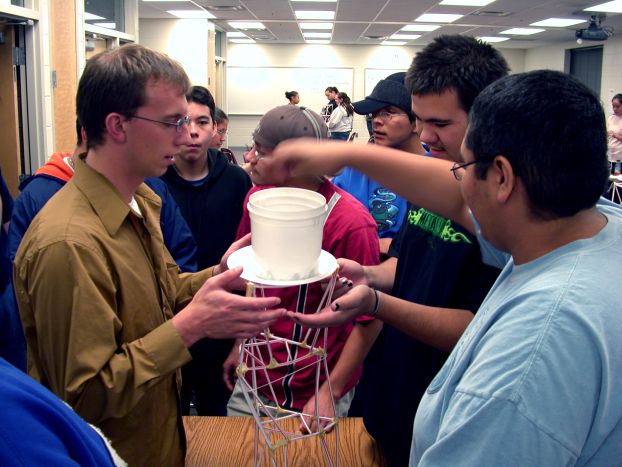Support for research on broadening participation
NSF funding provides opportunities for researchers to understand barriers and create methods for increasing diversity, equity and inclusion in engineering.

Supports broadening participation and equity in engineering through:
- Research, planning and conference grants.
- Mentoring hubs.
- Centers serving K-12, higher education, nonprofit and industry communities.
Learn more about Broadening Participation in Engineering.
Invites proposals that advance fundamental knowledge about the nature and dynamics of sexual or other harassment in STEM environments and inform anti-harassment efforts or facilitate culture and policy changes to ensure safe, harassment-free STEM environments.
Learn more about Fostering Harassment-Free STEM Education, Research and Workplace Environments.
Supports fundamental, applied and translational research that advances knowledge and practice about diverse, equitable, inclusive and accessible STEM and STEM education workplaces and postsecondary training environments for persons with disabilities.
Learn more about Workplace Equity for Persons with Disabilities in STEM and STEM Education.
Building capacity at underrepresented institutions
NSF invests in minority-serving and emerging research institutions to unleash the full potential of talents and innovations across the nation.

The program supports expanding research capabilities at minority-serving institutions, particularly historically Black colleges and universities, by establishing centers that integrate education and research to successfully train doctoral students.
Learn more about CREST HBCU-RISE.
The program supports the creation of research centers that will lead to strong societal impacts. These large-scale, interdisciplinary research centers establish collaborative partnerships with other institutions of higher education, national laboratories, private sector research laboratories and nonprofit organizations.
Learn more about the CREST Centers.
Supports new investigators at non-R1 institutions who have yet to receive funding from federal agencies as they initiate their research programs and advance as researchers, educators and innovators.
Learn more about Engineering Research Initiation.
Aims to enhance the research competitiveness of specific jurisdictions, such as states, territories, or commonwealths, by strengthening STEM capacity and capability through diverse investments in talent development and local infrastructure. The program envisions its jurisdictions as recognized contributors to the national and global STEM research enterprise.
Learn more about EPSCoR.
Supports the development of the research enterprise, particularly at emerging research and minority-serving institutions, to address the complexity of pursuing and managing externally supported activities.
Learn more about GRANTED.
Supports research at public and private historically Black colleges and universities to strengthen research capacity and promote engagement with NSF.
Learn more about HBCU-EIR.
Supporting a diverse community
NSF-funded networks and opportunities create and support a diverse, inclusive science and engineering enterprise.

Brings together the power of many by connecting educational institutions, individuals, alliances, pilot programs, federal agencies and other entities across the nation working to change inequitable systems, ensure accessibility and inclusivity and broaden participation in STEM education and careers. The network is part of the NSF Eddie Bernice Johnson Inclusion across the Nation of Communities of Learners of Underrepresented Discoverers in Engineering and Science Initiative.
Aims to broaden the implementation of evidence-based systemic change strategies that promote gender equity for STEM faculty in academia.
Learn more about ADVANCE.
Aims to reduce or remove barriers to participation in research by persons with physical disabilities by providing special equipment and assistance under awards made by NSF. It supports developing and demonstrating special equipment that facilitates their work performance.
Learn more about FASED.
Invites conference proposals and supplemental funding requests that address the intersections between disability and fundamental science to increase access to and equity in STEM research and training among persons with disabilities.
Learn more about the STEM-APWD.
Training and mentoring
NSF funding opportunities help communities build and nurture a diverse engineering workforce.

Supports early-career PhDs by funding university research postdoctoral fellowships. In addition to hands-on academic research with a faculty advisor, fellows participate in professional development and mentoring activities designed to prepare them for future research careers.
Learn more about eFellows.
Provides graduate students with experiential learning opportunities through research internships in non-academic settings.
Learn more about INTERN.
Supports active research participation by undergraduate students in any research areas funded by NSF.
Learn more about REU.
Supports the active involvement of research participants (high school students, STEM teachers, guidance counselors and academic advisors, undergraduate STEM students, faculty and veterans) in hands-on research to bring participants into collaboration with suitable STEM mentors and expose them to a rich research experience.
Learn more about REM.
Supports alternate pathways to encourage veterans' engagement in STEM research in academia and industry.
Learn more about Veterans Research Supplements.
Career-life balance and alternative career paths
NSF activities help attract, retain and support graduate students, postdoctoral researchers and faculty along various career paths in STEM fields.

Supports additional personnel (e.g., a technician or research assistant) to sustain research while the senior personnel, postdoctoral researcher or graduate student is on family leave for primary dependent care responsibilities or other direct family considerations.
Learn more about the Career-Life Balance (CLB) initiative.
Supports experienced researchers in forging new research directions or entering new fields. Research must be in one or more areas supported by the NSF Division of Civil, Mechanical and Manufacturing Innovation.
Learn more about BRITE.
Supports research and retraining for scientists and engineers after a research hiatus. Supported work must fall within the scope of the NSF Division of Chemical, Bioengineering, Environmental and Transport Systems or the NSF Division of Chemistry.
Learn more about RARE.
Additional resources
Broadening Participation in STEM initiative
Supports a diverse and capable workforce, vital to maintaining the nation's standard of excellence in STEM.
NSF Committee on Equal Opportunities in Science and Engineering (CEOSE) reports
The NSF Committee on Equal Opportunities advises the agency on policies, programs, practices and activities to encourage the full participation of women, underrepresented racial/ethnic populations and persons with disabilities within all levels of the nation's STEM enterprise.
National Science Board's Vision 2030
The National Science Board Vision 2030 Task Force aims to increase support for impactful investments in fundamental science and engineering research and a STEM-educated workforce. The task force is planning activities to gather input and perspective from the rest of the board, NSF leadership, staff and relevant stakeholders within and outside the government.
National Center for Science and Engineering Statistics (NCSES)
NCSES is a principal statistical agency within NSF that is responsible for collecting and reporting data on the U.S. science and engineering enterprise. The NCSES Diversity and STEM report provides data on the participation of women, minorities and persons with disabilities in science and engineering.
